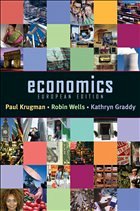Economics: European Edition by leading economist Paul Krugman and lecturers Robin Wells and Kathryn Graddy is the ideal text for introductory economics, bringing together an international scope of real world examples and economic theory, which students may apply to their everyday lives. Economics is written in a style that is relevant, accessible and entertaining for students; its unique story telling approach making economic theories easier to understand and absorb. The text is supported by a number of features to enhance student understanding as well as a full array of supplements to consolidate the learning process.
Table of contents:
WHAT IS ECONOMICS?
Table of Contents:
Introduction: The Ordinary Business of Life
First Principles
Economic Models: Trade-offs and Trade
Appendix: Graphs in Economics
SUPPLY AND DEMAND
Supply and Demand
Price and Quantity Controls
Elasticity
INDIVIDUALS AND MARKETS
Consumer and Producer Surplus
Making Decisions
THE PRODUCER
Behind the Supply Curve: Inputs and Costs
Perfect Competition and the Supply Curve
THE CONSUMER
The Rational Consumer
Consumer Preferences and Consumer Choice
MARKETS AND EFFICIENCY
Factor Markets and the Distribution of Income
Appendix: Indifference Curve Analysis of Labour Supply
Efficiency and Equity
MARKET STRUCTURE BEYOND PERFECT COMPETITION
Monopoly
Oligopoly
Monopolistic Competition and Product Differentiation
EXTENDING MARKET BOUNDARIES
International Trade
Uncertainty, Risk, and Private Information
MICROECONOMICS AND PUBLIC POLICY
Externalities
Public Goods and Common Resources
Taxes, Government Spending and Income Distribution
NEW DIRECTIONS FOR MARKETS
Technology, Information Goods and Network Externalities
INTRODUCTION TO MACROECONOMICS
Macroeconomics: The Big Picture
Tracking the Macroeconomy
THE ECONOMY IN THE LONG RUN
Long-Run Economic Growth
Savings, Investment Spending, and the Financial System
SHORT RUN ECONOMIC FLUCTUATIONS
Aggregate Supply and Aggregate Demand
Income and Expenditure
Appendix: Deriving the Multiplier Algebraically
Fiscal Policy
Appendix: Taxes and the Multiplier
Money and Banking
Monetary Policy
THE SUPPLY SIDE AND THE MEDIUM RUN
Labour markets, unemployment and inflation
Inflation, Disinflation, and Deflation
THE OPEN ECONOMY
Open -Economy Macroeconomics
EVENTS AND IDEAS
The Making of Modern Macroeconomics
Table of contents:
WHAT IS ECONOMICS?
Table of Contents:
Introduction: The Ordinary Business of Life
First Principles
Economic Models: Trade-offs and Trade
Appendix: Graphs in Economics
SUPPLY AND DEMAND
Supply and Demand
Price and Quantity Controls
Elasticity
INDIVIDUALS AND MARKETS
Consumer and Producer Surplus
Making Decisions
THE PRODUCER
Behind the Supply Curve: Inputs and Costs
Perfect Competition and the Supply Curve
THE CONSUMER
The Rational Consumer
Consumer Preferences and Consumer Choice
MARKETS AND EFFICIENCY
Factor Markets and the Distribution of Income
Appendix: Indifference Curve Analysis of Labour Supply
Efficiency and Equity
MARKET STRUCTURE BEYOND PERFECT COMPETITION
Monopoly
Oligopoly
Monopolistic Competition and Product Differentiation
EXTENDING MARKET BOUNDARIES
International Trade
Uncertainty, Risk, and Private Information
MICROECONOMICS AND PUBLIC POLICY
Externalities
Public Goods and Common Resources
Taxes, Government Spending and Income Distribution
NEW DIRECTIONS FOR MARKETS
Technology, Information Goods and Network Externalities
INTRODUCTION TO MACROECONOMICS
Macroeconomics: The Big Picture
Tracking the Macroeconomy
THE ECONOMY IN THE LONG RUN
Long-Run Economic Growth
Savings, Investment Spending, and the Financial System
SHORT RUN ECONOMIC FLUCTUATIONS
Aggregate Supply and Aggregate Demand
Income and Expenditure
Appendix: Deriving the Multiplier Algebraically
Fiscal Policy
Appendix: Taxes and the Multiplier
Money and Banking
Monetary Policy
THE SUPPLY SIDE AND THE MEDIUM RUN
Labour markets, unemployment and inflation
Inflation, Disinflation, and Deflation
THE OPEN ECONOMY
Open -Economy Macroeconomics
EVENTS AND IDEAS
The Making of Modern Macroeconomics

